Kent Coaching News
Last amended at 28-09-19

Coaching Secretary -
Stella Bandhu 07960
371958
coaching@kcaa.org.uk
England Athletics Coach and Athlete training days for 2019/20:
Sprints
Endurance
Throws
Jumps
Kent and Medway Athletics Network organise a series of
inclusive coach development workshops covering generic and specific topics.
The primary focus of these is coach development although athletes are often
invited along too to help with demonstrations.
Our 2019
programme will be published here
and on the KCAA Facebook page
We are keen to respond to requests for workshops or
flying coach visits to your own club/s. If you have an idea for an event,
please email Alison Strange (Kent and Medway Athletics Network Coaching
Workshops Organiser
coachdevelopment.kan@gmail.com
Recent News
Date: 7 July 2015
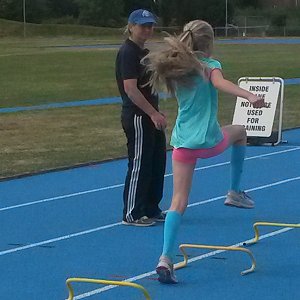 Sprints
and Hurdles Workshop help Dartford Harriers celebrate refurbished track.
Sprints
and Hurdles Workshop help Dartford Harriers celebrate refurbished track.
Dartford Harriers Athletics Club recently a hosted sprints and hurdles
workshop for coaches. The half day workshop focused on covering the basics
of hurdling, sprint starts, the biomechanics of running and multi-direction
movement skills.
The session was led by coach June Plews, who has coached at all levels of
the sport from county up to international level. She has developed athletes
to all levels and has taken athletes as far as Euro Juniors, world Youths
and World Juniors.
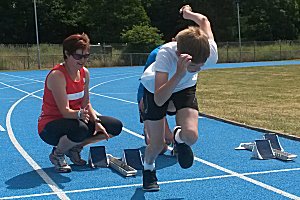
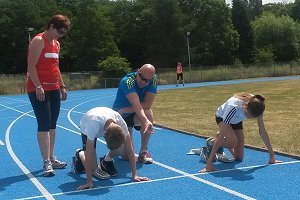
The workshop was organised by Kent and
Medway Athletics Network at the request of Dartford Harriers. “Several of
our coaches wanted to develop their knowledge of sprints and hurdles and
they really enjoyed this opportunity.“ said Dartford Harriers Chairperson
Clare Capon.
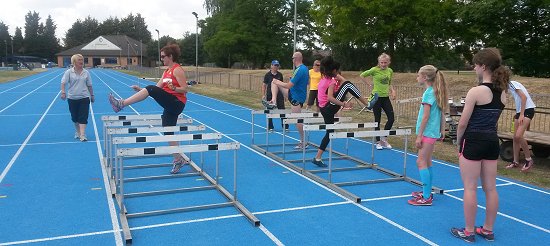
Date: 16 July 2014
Wheelchair Racing ‘Flying Coach
Visit’ - Sunday 13th July 2014
5 coaches from across the Kent and
Medway Athletics Network attended an introduction to Disability Athletics
and Wheelchair Racing at the Julie Rose Stadium in Ashford on Sunday 13th
July.
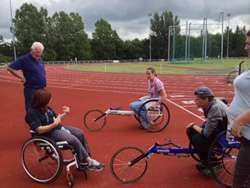 The
workshop was led by Nicole Evans who until recently worked as an Athletics
Activator for England Athletics in London. She has competed in wheelchair
racing distances of 100m up to 3miles and came 7th in the Mini London
Marathon in 2004. She now coaches wheelchair-based athletes herself and
lectures in Sports Psychology.
The
workshop was led by Nicole Evans who until recently worked as an Athletics
Activator for England Athletics in London. She has competed in wheelchair
racing distances of 100m up to 3miles and came 7th in the Mini London
Marathon in 2004. She now coaches wheelchair-based athletes herself and
lectures in Sports Psychology.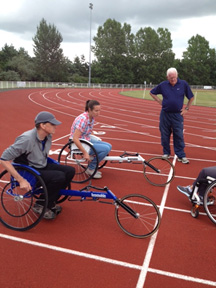
Nicole started with a theory session
where we discussed appropriate terminology (e.g athletes who are ‘wheelchair
users’ rather than being ‘wheelchair bound’. Coaches also had a brief intro
to the biomechanics and physiology of wheelchair racing as well as the
psychology and classifications system. Now I understand what all those T
numbers from the Paralympics meant! T31-34 categories are wheelchair based
athletes with cerebral palsy or a neurological disability while the T51-54
classification covers those with spinal cord injuries or amputees.
We then headed out to the track for
an introduction to the racing wheelchair, tips on helping athletes get in
and out of the chair, optimal seating position and use of the compensator
(for going round bends). Nicole also covered recommended strength and
conditioning exercises using resistance bands and medicine ball to help
athletes adjust to the demands of wheelchair racing.
Ashford AC Coach, Janine Brown
commented "Thoroughly enjoyed the workshop. The classification system is
much clearer to me now that Nicole has explained it. I’m looking forward to
the next workshop."
All participants felt more confident
about supporting and coaching their disabled athletes after the session and
a follow up workshop is planned for later in the year where Nicole will run
through a full session plan on the track.
Date: 3 April 2014
MARA YAMAUCHI VISITS KENT TO
SPEAK TO ENDURANCE COACHES AND ATHLETES
Over fifty coaches and endurance
athletes from across Kent attended an evening with Mara Yamauchi held at
Sevenoaks School on Monday 31st March. Most of the audience,
tapering for a spring marathon, were keen to pick the brains of Great
Britain’s second fastest ever female over the marathon distance (after Paula
Radcliffe).
Mara holds a marathon PB of 2:23:12
and has competed at 2 Olympic Games; London 2012 and Beijing 2008 (where she
came 6th).
Although a late entrant into the
marathon event (she didn’t take up serious training until the age of 29),
Mara started by stressing the importance of an active childhood. She spent
her early life in Kenya and benefited from a healthy outdoor lifestyle. She
vividly remembers watching the 1984 Olympics from Los Angeles and dreaming
of becoming an Olympian one day herself.
“Looking after the basics”
Quality training is just one facet
of becoming a successful marathoner. Mara supports a holistic approach
paying attention to adequate rest, good nutrition, injury prevention and the
importance of making the right lifestyle choices. Practical support from
those close to you is also vital and soon after she began serious training,
Mara’s Japanese husband Shigetoshi became her coach.
Mara spent a large part of her life
as a professional athlete living and training in Japan. She described the
incredible work ethic of Japanese athletes who regularly run 160 miles per
week supported by the company teams of large corporations such as Nissan and
Toyota. She also recommended some Japanese delicacies as ideal pre-race
fuel; Udon noodles for dinner followed by bowls of rice and Miso soup (the
high salt content helps the body to retain water) on the morning of the
race.
“Know your body”
Mara would target 2 marathons per
year and described a typical day during a period of intense training. Upon
waking, the first task would be to take her pulse since a raised heart rate
would indicate that her body was fighting an illness. Listening to your body
and knowing when to take it easy is important. After a coffee and a small
breakfast, training would start at 9am with the first run of the day. Once
complete, she’d take an ice bath, eat lunch and then sleep for 1-2 hours.
The second training session of the day might be a gym workout, swim, bike
session or an easier jog. After a massage and dinner, it would be time for
bed.
Mara would undertake strength and
conditioning work twice a week to build strength (helping her to maintain
good form in the latter stages of a marathon) as well as preventing injury.
Specific exercises would include squats, step ups, plank and core work using
a medicine ball.
“Feeling confident at your
marathon pace is really important”
On preparing for the all-important
race, Mara advises taking care of all the logistical details in advance so
you don’t waste valuable mental energy worrying about whether you have
bought the right gels or if your new running shoes will give you blisters!
As well as tempo runs and interval training, she stressed the importance of
completing large sections of the long run at marathon pace.
Coaches and athletes were then given
ample opportunity to ask Mara questions and seek advice on their on their
own marathon goals. When asked “what next” following her retirement from
elite competition in January 2013, Mara replied that she is currently
completing her ‘Athletics Coach’ qualification with England Athletics and
still runs 4-5 times per week for enjoyment and to stay healthy. She is also
developing a freelance career as a speaker and writer.
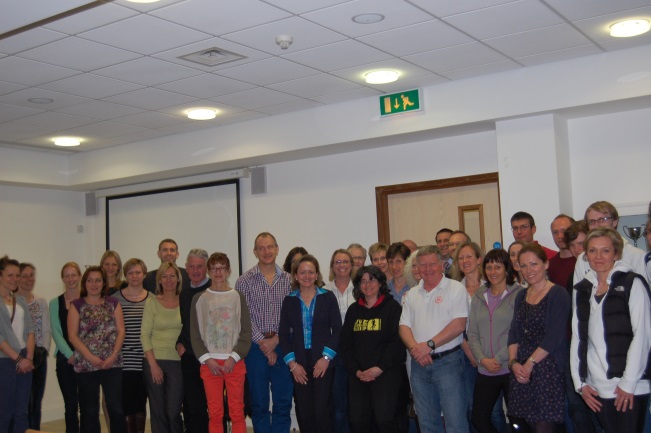
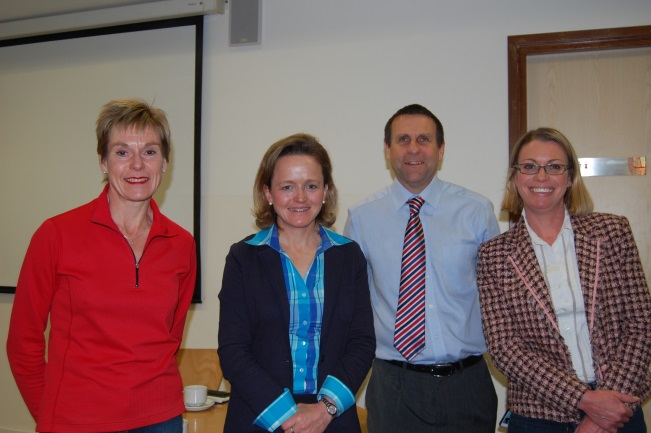
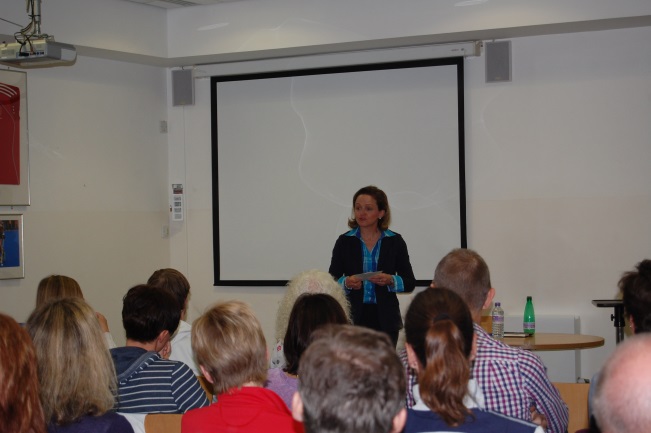
For more information, please contact
Alison Strange (Kent Athletics Network) on 07766 337129 or
coachdevelopment.kan@gmail.com
Alison Strange
Kent and Medway Athletics Network Coaching Workshop Organiser
coachdevelopment.kan@gmail.com
07766 337129
3 May 2012
England Athletics, UKA and the other home country
governing bodies are alert to our responsibilities to all participants in
athletics in respect of all aspects of health and safety. One particular
area that young athletes and their parents must be aware of is the risk of
cardiac problems.
There have been instances of young athletes suffering
potentially fatal heart conditions without being aware that they are at
risk.
England Athletics would like to make you aware of a
piece of work that has been undertaken by UKA. UKA has worked with Cardiac
Risk in the Young (CRY) for several years, providing a screening service to
athletes on the World Class Performance Programme. UKA and CRY are now
seeking to encourage more athletes to use CRY’s screening service to help to
identify any cardiac problems that may be otherwise hidden.
CRY is a charity that was established to raise
awareness of conditions that can lead to the sudden cardiac death of young
people. They operate a screening programme at a number of clinics around the
UK and support this with mobile units that travel to other locations.
Full information about CRY and their services can be
found on their website at www.c-r-y.org.uk
. Young people between the age of 14 and 35 who would like to have cardiac
testing can go to www.testmyheart.org
.
You can also see
www.uka.org.uk/governance/health-safety/cardiac-screening-for-athletes/
for information on work being done by UKA in this area.
